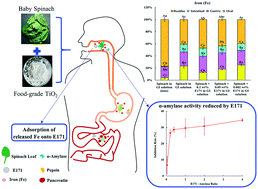Food-grade titanium dioxide particles decrease the bioaccessibility of iron released from spinach leaves in simulated human gastrointestinal tract†
Abstract
Food grade titanium dioxide particles (E171) are added to various foods as whitening agents, including chewing gums, candies, sauces, salad dressings, and powdered milks. Salad dressings are often consumed with leafy green vegetables, such as spinach, which are rich in minerals. We hypothesized that the presence of E171 particles in foods would interfere with the bioaccessibility of essential minerals. Therefore, we investigated the impact of E171 on the bioaccessibility of minerals (Ca, K, Mg, Fe, Mn, Zn, P and S) released from spinach leaves using a simulated human digestion tract (GIT) that involves oral, gastric, and small intestinal phases. The digestive enzymes used in the GIT model, including α-amylase, pepsin, and pancreatin, prompted mineral release from spinach leaves under the simulated GIT conditions (except for Ca). E171 particles did not impact the bioaccessibility of most minerals, except for Fe. The final bioaccessibility of Fe decreased from 59% without E171 to 53% with 0.2 wt% E171. Interestingly, the decrease in Fe bioaccessibility mainly occurred within the oral phase, rather than the gastric or intestinal phases. Mechanistic studies indicated that the reduction in Fe bioaccessibility was due to the following two processes: (i) inhibition of α-amylase activity by E171, thereby interfering with Fe release from the spinach leaves and (ii) adsorption of Fe onto E171 particles. The results of this study are useful for assessing the potential impact of E171 on the human digestive process and the nutritional value of foods.

- This article is part of the themed collection: Environmental Science: Nano Recent HOT Articles


 Please wait while we load your content...
Please wait while we load your content...
